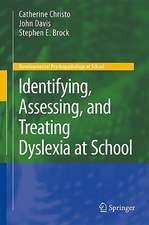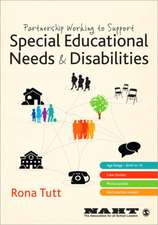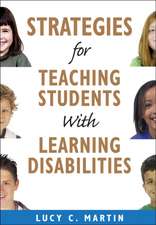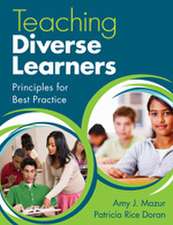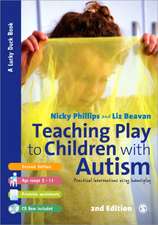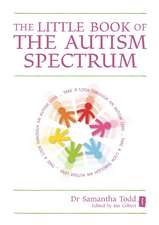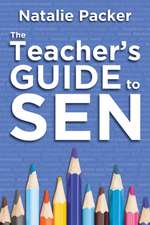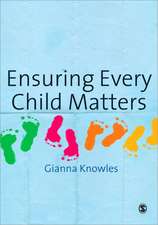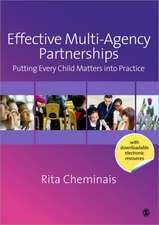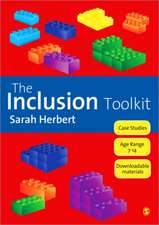The Perfect Senco: Bringing Maths and English Together Across the Curriculum: Perfect
Autor Natalie Packeren Limba Engleză Hardback – 25 sep 2013
Leading provision to improve outcomes for children with special educational needs has never been more important. Natalie Packer brings her expertise as a special education needs consultant to offer practical guidance for coordinators and other school leaders that will ensure your school is delivering outstanding progress for all children.
Preț: 84.78 lei
Nou
Puncte Express: 127
Preț estimativ în valută:
16.22€ • 17.06$ • 13.40£
16.22€ • 17.06$ • 13.40£
Carte disponibilă
Livrare economică 27 martie-10 aprilie
Livrare express 12-18 martie pentru 20.25 lei
Preluare comenzi: 021 569.72.76
Specificații
ISBN-13: 9781781351048
ISBN-10: 178135104X
Pagini: 148
Dimensiuni: 127 x 175 x 23 mm
Greutate: 0.25 kg
Editura: INDEPENDENT THINKING
Seria Perfect
Locul publicării:United Kingdom
ISBN-10: 178135104X
Pagini: 148
Dimensiuni: 127 x 175 x 23 mm
Greutate: 0.25 kg
Editura: INDEPENDENT THINKING
Seria Perfect
Locul publicării:United Kingdom
Cuprins
Acknowledgements
Foreword by Jackie Beere
List of abbreviations
Introduction
1. The SENCO: centre stage for school improvement
2. Leading the way: providing strategic direction and
development
3. High quality SEN provision – all day, every day
4. Tracking and monitoring to raise achievement
5. Every teacher’s responsibility:developing your colleagues
6. Working in harmony: effective partnerships
7. Bringing it all together: self-evaluation and Ofsted
Conclusion
The perfect SENCO: quick checklist of key actions
References and further reading
Recenzii
The Perfect SENCO is an absolute ‘must’ for head teachers and SENCOs. Natalie is highly skilled at explaining the ‘big picture’ and then providing practical strategies to ensure that what happens in school ‘syncs’ with national initiatives. If the advice in this book is followed, then schools can be assured
that they are Ofsted ready and also that all statutory requirements are met. Included in the book are pro formas that can easily be adapted for each establishment or used as they are.
Each chapter concludes with a ‘mini’ plenary which is useful to consolidate learning and also to use as a quick reference point.
The Perfect SENCO is a special book: it ensures that it provides up to date advice which incorporates the changing landscape of SEN. It is also educational in that it can be used as a catalyst for school improvement and evaluation, meeting the requirements of Ofsted.
The book takes into consideration the needs of children, their outcomes being the main focus. If teachers and senior leaders implement the strategies, this will provide a co-ordinated approach for school improvement.
I would recommend this book, without reservation, to every school.
Carol Aspinall, Independent Education Consultant
This book is an absolute must read for all teachers and school leaders. Well selected accounts of practice and case studies offer insight into the practical aspects of achieving the aim of success for all our children, irrespective of need. There is no doubt that this should be on the reading list of any aspirant teacher who is attempting to discover a moral purpose and personal vision for education. Natalie’s wealth of experience of special educational needs strategy, coupled with her huge desire for equality for all children, gives a clear insight into how to develop an educational philosophy whilst enabling opportunities for any teacher to be confident in becoming The Perfect SENCO.
Chris Wheatley, Executive Head The Cotgrave Candleby Lane School, C.E.O. Flying High Trust
The Perfect SENCO provides a comprehensive and realistic view of one of the most important teaching roles in our schools today. The current climate of change surrounding the provisions we make in our schools, and settings for children and young people with special educational needs, will lead to an
even greater level of significance for the role of the SENCO and the professional development implications to ensure that every teacher is a teacher of every child. As Natalie rightly identifies, achieving perfection is often out of reach for most of us; however, The Perfect SENCO offers all of us in education, not just SENCOs, a fantastic, highly readable guide in striving
for perfection to ensure that the needs of our most vulnerable pupils and students are fundamental to all schools’ philosophy, strategy, planning and practice. Most importantly,the book provides clear routes in determining effective outcomes for children and young people. The top tips, useful summaries, checklists and templates will refresh any SENCO’s toolbox, enabling them to keep up-to-date, at the top of their game and meet the challenge of the changing landscape for SEN. This is a must read for every teacher, SENCO, senior
leader and school governor.
Jane Friswell, SEND Consultant, Education Development Officer, nasen (National Association of Special Educational Needs)
Never has education seen so much change in such a short period of time, especially with regard to SEND and its coordination. During the coming academic year, and from 2014, schools will need to work differently, leaving behind the
medicalised approach to SEND as a deficit model and moving towards a more proactive, whole-school approach. This is something good schools have always done; however, for some a more collaborative, corporate approach will be a significant change. This is, however, essential in order to meet the needs of twenty-first century learners.
Natalie Packer’s new book, The Perfect SENCO, considers the key tenets of the twenty-first century SENCO, with particular regard to the new ways of working that colleagues will face.
Considering the SENCO role as one centred around school improvement is an important distinction that some colleagues maintaining an approach based upon a medical model will need to understand. This publication tackles this as part of a whole-school approach, considering high quality provision and effective partnerships as key elements of that new way of working.
In addition, clear guidance and support with regard to selfevaluation and inspections helps SENCO colleagues measure and evidence impact; another key facet of the modern SENCO way.
Throughout the book, case studies and examples, along with Top Tips, bring the text to life - these allow the reader an opportunity to understand the context and support a greater depth of understanding. This book is timely for a number of reasons, not only due to the significant changes that lie ahead with regard to provision and assessment of SEND, but also because, at a time of austerity, it allows the reader to see that effective provision does not need to be expensive; a desire to improve outcomes as part of a whole school approach is a key starting point. This, coupled with the themes that run through the book, with regard to collaboration and partnerships, school improvement and evaluation, provide a condensed and cohesive manuscript that should
find a valuable home in all SENCO’s offices/bookcases.
As an experienced SENCO, who has been fortunate enough to coordinate some high quality outcomes for some of our most vulnerable learners, I can align myself with all the publication's key themes; this is no surprise as good practice has
always been one of partnerships and collaboration that is child-centred. As a tool for helping focus experienced SENCOs on key areas, or for the newly appointed; The Perfect SENCO is an ideal companion for the challenges we face; especially in light of the imminent, significant changes in policy and provision.
I have no reservations in wholeheartedly recommending this book to anyone SENCO, teacher, Head teacher, member of support staff, or anyone interested
in improving outcomes for our most vulnerable; easy to read and understand, the distillation of what can be extremely complex into clear and explicit areas
is a real breath of fresh air in the dense fog of political change.
Gareth D Morewood, Director of Curriculum Support & Specialist Leader of Education, Priestnall School, Honorary Research Fellow, University of Manchester
that they are Ofsted ready and also that all statutory requirements are met. Included in the book are pro formas that can easily be adapted for each establishment or used as they are.
Each chapter concludes with a ‘mini’ plenary which is useful to consolidate learning and also to use as a quick reference point.
The Perfect SENCO is a special book: it ensures that it provides up to date advice which incorporates the changing landscape of SEN. It is also educational in that it can be used as a catalyst for school improvement and evaluation, meeting the requirements of Ofsted.
The book takes into consideration the needs of children, their outcomes being the main focus. If teachers and senior leaders implement the strategies, this will provide a co-ordinated approach for school improvement.
I would recommend this book, without reservation, to every school.
Carol Aspinall, Independent Education Consultant
This book is an absolute must read for all teachers and school leaders. Well selected accounts of practice and case studies offer insight into the practical aspects of achieving the aim of success for all our children, irrespective of need. There is no doubt that this should be on the reading list of any aspirant teacher who is attempting to discover a moral purpose and personal vision for education. Natalie’s wealth of experience of special educational needs strategy, coupled with her huge desire for equality for all children, gives a clear insight into how to develop an educational philosophy whilst enabling opportunities for any teacher to be confident in becoming The Perfect SENCO.
Chris Wheatley, Executive Head The Cotgrave Candleby Lane School, C.E.O. Flying High Trust
The Perfect SENCO provides a comprehensive and realistic view of one of the most important teaching roles in our schools today. The current climate of change surrounding the provisions we make in our schools, and settings for children and young people with special educational needs, will lead to an
even greater level of significance for the role of the SENCO and the professional development implications to ensure that every teacher is a teacher of every child. As Natalie rightly identifies, achieving perfection is often out of reach for most of us; however, The Perfect SENCO offers all of us in education, not just SENCOs, a fantastic, highly readable guide in striving
for perfection to ensure that the needs of our most vulnerable pupils and students are fundamental to all schools’ philosophy, strategy, planning and practice. Most importantly,the book provides clear routes in determining effective outcomes for children and young people. The top tips, useful summaries, checklists and templates will refresh any SENCO’s toolbox, enabling them to keep up-to-date, at the top of their game and meet the challenge of the changing landscape for SEN. This is a must read for every teacher, SENCO, senior
leader and school governor.
Jane Friswell, SEND Consultant, Education Development Officer, nasen (National Association of Special Educational Needs)
Never has education seen so much change in such a short period of time, especially with regard to SEND and its coordination. During the coming academic year, and from 2014, schools will need to work differently, leaving behind the
medicalised approach to SEND as a deficit model and moving towards a more proactive, whole-school approach. This is something good schools have always done; however, for some a more collaborative, corporate approach will be a significant change. This is, however, essential in order to meet the needs of twenty-first century learners.
Natalie Packer’s new book, The Perfect SENCO, considers the key tenets of the twenty-first century SENCO, with particular regard to the new ways of working that colleagues will face.
Considering the SENCO role as one centred around school improvement is an important distinction that some colleagues maintaining an approach based upon a medical model will need to understand. This publication tackles this as part of a whole-school approach, considering high quality provision and effective partnerships as key elements of that new way of working.
In addition, clear guidance and support with regard to selfevaluation and inspections helps SENCO colleagues measure and evidence impact; another key facet of the modern SENCO way.
Throughout the book, case studies and examples, along with Top Tips, bring the text to life - these allow the reader an opportunity to understand the context and support a greater depth of understanding. This book is timely for a number of reasons, not only due to the significant changes that lie ahead with regard to provision and assessment of SEND, but also because, at a time of austerity, it allows the reader to see that effective provision does not need to be expensive; a desire to improve outcomes as part of a whole school approach is a key starting point. This, coupled with the themes that run through the book, with regard to collaboration and partnerships, school improvement and evaluation, provide a condensed and cohesive manuscript that should
find a valuable home in all SENCO’s offices/bookcases.
As an experienced SENCO, who has been fortunate enough to coordinate some high quality outcomes for some of our most vulnerable learners, I can align myself with all the publication's key themes; this is no surprise as good practice has
always been one of partnerships and collaboration that is child-centred. As a tool for helping focus experienced SENCOs on key areas, or for the newly appointed; The Perfect SENCO is an ideal companion for the challenges we face; especially in light of the imminent, significant changes in policy and provision.
I have no reservations in wholeheartedly recommending this book to anyone SENCO, teacher, Head teacher, member of support staff, or anyone interested
in improving outcomes for our most vulnerable; easy to read and understand, the distillation of what can be extremely complex into clear and explicit areas
is a real breath of fresh air in the dense fog of political change.
Gareth D Morewood, Director of Curriculum Support & Specialist Leader of Education, Priestnall School, Honorary Research Fellow, University of Manchester
Notă biografică
Natalie Packer is an education consultant specialising in SEN and School Improvement. Having previously worked for the National Strategies SEN team and as an Local Authority Adviser for SEN, combined with her recent headship experience, Natalie has had the opportunity to observe all manner of school practice, allowing her to assess the best catalysts for effective teaching and learning.
Jackie Beere, Head teacher at Campion School, England until 2006, is now a consultant, trainer and School Improvement Partner. She spent three years as an Advanced Skills Teacher leading and implementing innovative Teaching and Learning initiatives including KS3 and 4 Learning to Learn and Thinking Skills programmes. She was awarded the OBE in November 2002 for services to education, having trained many teachers and school leaders in the latest theory and practice of learning to learn and emotional intelligence. She introduced Learning to Learn through Opening Minds, a competency-based curriculum at her school in 2006, after a two year pilot project proved very successful.
Jackie Beere, Head teacher at Campion School, England until 2006, is now a consultant, trainer and School Improvement Partner. She spent three years as an Advanced Skills Teacher leading and implementing innovative Teaching and Learning initiatives including KS3 and 4 Learning to Learn and Thinking Skills programmes. She was awarded the OBE in November 2002 for services to education, having trained many teachers and school leaders in the latest theory and practice of learning to learn and emotional intelligence. She introduced Learning to Learn through Opening Minds, a competency-based curriculum at her school in 2006, after a two year pilot project proved very successful.
Extras
Foreword by Jackie Beere
A school is only as good as the progress of its most vulnerable, challenging child. This has never been more true than now, as Ofsted has increased the pressure on schools to ensure they are meeting the needs of all pupils, especially those with learning challenges. However, funding levels have been cut, so the number of pupils meeting the criteria to attract extra resources and one-to-one support continues to spiral downwards.
Allied to this, the credibility of teaching assistants – the traditional support for needy pupils – is being questioned as research emerges which challenges their effectiveness in helping them to become better learners. The use that schools make of the Pupil Premium to support underprivileged children
is also being ruthlessly scrutinised. If interventions to help needy pupils are not delivering results, we can now expect big questions to be asked of the school leadership.
The school special educational needs coordinator (SENCO), who drives the policy and practice that leads to successful outcomes for these special children, has become pivotal to the success of every school. This leadership role, rooted in
ensuring that everyday classroom practice caters for vulner-able learners, provides a tough challenge. The work that SENCOs do can only be effective if it is entrenched in the values and vision of a school leadership which puts learning at the heart of its mission, and the SENCO at the heart of its leadership team.
What Natalie Packer has managed to do brilliantly in this book is to provide that vision and framework to help every practising SENCO, or would-be SENCO, understand how to do the very best job for vulnerable children so that they can
make progress and close the gap. Closing that gap – between the children who succeed at school and those that, for whatever reason, struggle to achieve – is the key role of the SENCO and their team. However, this won’t be done solely
by providing one-to-one support, or nurture groups, or even a team of nthusiastic, retrained teaching assistants. The only way to really help these children to make outstanding progress is through the high expectations of every teacher in every classroom, every hour of every day for 38 weeks of the year. These children may not be getting the type of emotional support that creates resilient learners at home, so school could be the only chance they have.
A SENCO is thus central to the whole-school drive to realise consistently high quality teaching. This includes tracking and engaging pupils so that they can achieve their full potential. At the heart of high quality outcomes for all children is a culture of high expectations and the belief that there is a way
to help every child achieve more. The SENCO who can drive up expectations and commitment in every lesson and who, therefore, delivers results for the most challenging children, will be much in demand. This book is invaluable because it
is full of useful advice and practical strategies that will be used again and again to deliver that vision of outstanding progress for vulnerable children in every classroom.
This book is so good that it should be read not only by SENCOs but by every member of the leadership team, governors and every middle leader. Why? Because in order to deliver for all pupils, all teachers and leaders need to understand
how to find ways to help children with special educational needs to make breakthroughs in learning, gain confidence and achieve the very best results they can.
In uncertain times, with expectations high, one thing is certain – a school is only as good as its SENCO.
Jackie Beere, Tiffield
Textul de pe ultima copertă
The Perfect SENCO is the essenti
Real education isn’t about a race to the top of the class or the league table. It isn’t about being better than anyone else or accumulating as many qualifications as you possibly can. It’s about being helped to be the best you can possibly be by professionals who are skilled enough to know how to do it and compassionate enough to take the time to do it well. Nowhere is this philosophy more important than when it comes to supporting children with special educational needs and this book, written for our Perfect series by a SEN consultant with many years’ experience, will help you apply it to these children.
“The Perfect SENCO offers all of us in education, not just SENCOs, a fantastic, highly readable guide that ensures that the needs of our most vulnerable pupils and students are fundamental to all schools’ philosophy, strategy, planning and practice. Most importantly, the book provides clear routes that determine effective outcomes for children and young people.”
Jane Friswell, SEND Consultant, Education Development Officer, NASEN (National Association of Special Educational Needs)
“Natalie’s wealth of experience of special educational needs strategy, coupled with her huge desire for equality for all children, gives a clear insight into how to develop an educational philosophy whilst enabling opportunities for any teacher to be confident in becoming The Perfect SENCO.”
Chris Wheatley, Executive Head, The Cotgrave Candleby Lane School, C.E.O. Flying High Trust
Natalie Packer is an education consultant specialising in SEN and School Improvement. Having previously worked for the National Strategies SEN team and as an LA Adviser for SEN, combined with her recent headship experience, Natalie has had the opportunity to observe all manner of school practice, allowing her to assess the best catalysts for effective teaching and learning.
Descriere
Leading provision to improve outcomes for children with special educational needs has never been more important.



